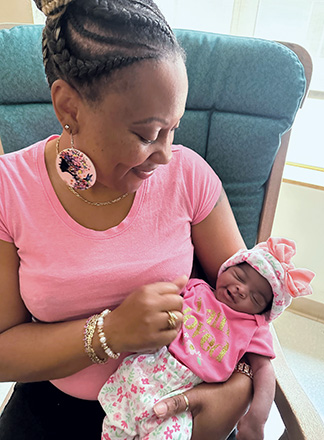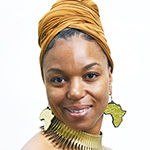Providence Swedish is addressing the especially high rate of maternal mortality for Black women through an initiative with doulas, navigators and other resources focused on improving birth experiences and outcomes for women of color.
Maternal mortality rates have been rising in the United States for the past decade. According to data curated by Seattle-based Providence Swedish, a nine-hospital system within Providence St. Joseph Health, between 800 and 900 women die annually nationwide
from childbirth complications. In the U.S. Black women are up to four times more likely as white women to die during or because of childbirth.
Providence Swedish is taking on this disparity through the Justice Unity Support Trust, or JUST, Birth Network, which it launched in 2022.
 Akangbe
Akangbe
The initiative provides women with a birth and family education program, culturally competent doulas, navigators who are people of color, and other resources. The initiative also includes a scholarship program to increase the pipeline of doulas who are
people of color.
Sauleiha Akangbe is the birth equity manager for Providence Swedish and the founder of the JUST Birth Network that is part of the initiative. Akangbe, who is Black, says, "The health system is not built for people who look like us. And it's not built
for people who are struggling with addiction and who have experienced trauma. The system fails people."
She says the doulas connect with expectant moms on an individual level. "We want every patient to have the birthing experience that we ourselves would want to have," she adds.
By and for Black women
Akangbe is a fourth-generation doula — a person trained to provide advice, information, emotional support, physical comfort and resources to a mother before, during and after she gives birth.

LaShaye Stanton-Phillips, a certified medical assistant and doula, cradles a baby whose mother was a client of hers in the Justice Unity Support Trust, or JUST, Birth Network. Providence St. Joseph Health's Providence Swedish subsystem launched
the network two years ago to provide support to pregnant women of color.
Akangbe had been working as a Providence Swedish doula since 2017 when that system's leadership approached her about developing a doula program for women of color. In 2019, she became the lead postpartum doula and then in 2020 she became the community
engagement lead and, with funding from Swedish Foundation, founded an overarching program called the Black Birth Empowerment Initiative.
In that role, with the backing of leadership, Akangbe canvassed local communities of color to get input to build a new program. She learned that many of the people she spoke to had very poor perceptions of maternity care at Providence Swedish. They
did not feel that the services were tailored to the needs of minority populations.
The Black Birth Empowerment Initiative grew into the JUST Birth Network, which began in 2022 with funding from the Providence St. Joseph's Health Equity fund.
Akangbe since has been hiring staff and contracting with doulas who are Black women and other people of color. About 50 doulas now are connected with the program. Each has an ethnic background that is well represented in the local community. Akangbe
has used their input and that of patients and community members to build out the programming.
Confidante, advocate
When expectant mothers who are Black, African American, African, Native American, Alaskan Native, Native Hawaiian or Pacific Islander seek care at Providence Swedish, their providers tell them about the JUST
Birth Network. They can learn about the services that are available and then can opt to sign on with one of the doulas.
Each doula gets to know her clients and their circle of family and friends personally. She learns what each expectant mom's hopes and fears are for her pregnancy and childbirth, what barriers and needs she faces, what childbirth customs or traditions
she wishes to observe, and what topics she needs education on. The doulas then carry out their clients' wishes, connecting them with appropriate resources, referring them to social service providers if need be, serving as a confidante and advocate,
and running interference when the moms encounter problems.
The program also provides navigators who can guide the moms to additional help within the health care system. The initiative also offers classes on childbirth topics.
All programming is tailored to the needs of women of color, says Akangbe.
Obstetrical violence
Natasha Blanchard is a childbirth educator and birth and postpartum facilitator, and LaShaye Stanton-Phillips is a certified medical assistant. Both women are doulas with the JUST Birth Network. They and
Akangbe say the initiative is needed because of the disparities that women of color face and because of the changing dynamics of the communities they live in.
 Blanchard
Blanchard
Akangbe says some of the most serious concerns women of color have as expectant moms and when giving birth in the hospital involve obstetric violence, medical hierarchy, medical racism and disrespect. She says providers who don't take the time to
learn about the needs and preferences of women of color may ignore what those women are saying, talk down to them, impose decisions on them or make decisions that are counter to the women's wishes. They may show no regard for the women's humanity.
When providers do not treat these women with respect and dignity, childbirth can "feel like a battlefield" for the mother, and she may feel she is not respected or heard, says Akangbe.
Blanchard explains that some of the disconnection that can happen between the woman giving birth and her medical providers comes down to cultural differences. The woman and her providers may fail to communicate well or understand one another. She
adds that in medicine, minority women "may not see a lot of people who look like us, and it's not just a distrust of the white coat but sometimes of the white face, too. The women may not feel safe. They may see that their providers don't understand"
their needs.
Akangbe notes that a disproportionate number of women of color experience trauma and addiction compared to white women, and medical providers must be attuned to these special circumstances before, during and after the women give birth. Stanton-Phillips
and Blanchard commonly work with women with these types of concerns.
Blanchard says: "For many of us Black women, there is generational trauma that can affect us. A program like JUST Birth is needed because we often feel we are not heard, not advocated for, not represented, not seen" by providers.
She adds that many women of color have other emotional, physical and psychological needs that come to the surface during pregnancy and childbirth that must be addressed.
On top of all this, Stanton-Phillips notes, the closeknit family and friend networks that used to form a supportive community around pregnant women and new moms have broken down for many women. This is because many women's families are now scattered,
rather than living close together.
Progress
Since the start of the Black Birth Empowerment Initiative and its JUST Birth Network, hundreds of women of color have gotten support from the doulas and navigators, received help connecting with social services and other
resources, and accessed the education the initiative offers. Plans call for the initiative to add Latina doulas. In time, Akangbe says, the initiative plans to help spread the approach beyond Providence Swedish, to help women at even more facilities.
The initiative has been having an impact on the obstetrical medical providers at Providence Swedish by helping to build awareness of the particular needs of women of color. Akangbe says she's seen great progress among medical staff members, with many
gaining a better understanding of the needs of women of color and of how to meet those needs in a more culturally competent way.
Akangbe sees awareness spreading throughout Providence Swedish but says there's more work to do. "We need care and compassion throughout our hospitals, not just in the birthing area," she says. "We want more patient advocacy, better relationships
with the community and medical provider accountability when it comes to health equity.
"We need to fix the system," she says of the grand aspirations of the initiative.
To view videos about the program and to read patient testimonials, visit swedish.org/services/pregnancy-and-childbirth/just-birth.